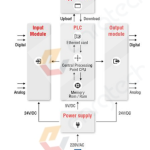
Introduction
In today’s fast-paced global business environment, efficient management of transportation is significant in ensuring the smooth flow of goods from manufacturers to consumers. Transportation Management Systems (TMS) have emerged as indispensable tools for businesses seeking to optimise their logistics operations. Among the choices available, cloud-based TMS solutions have gained significant popularity. This article provides a comprehensive comparison guide, highlighting key aspects to consider when designing a TMS using cloud-based software.
Understanding Transportation Management Systems (TMS)
TMS is a software solution designed to streamline and automate various aspects of transportation and logistics management. TMS software provides tools and features that enable businesses to plan, execute, and monitor the movement of goods and freight throughout their supply chain. It encompasses functions such as route planning, carrier selection, shipment tracking, and performance analytics. TMS software aims to improve operational efficiency, reduce transportation costs, enhance visibility, and ensure timely deliveries, making it essential for multiple businesses.
The Rise of Cloud-Based TMS: A Brief Overview
Cloud-Based Transportation Management Systems refer to software solutions that help organisations manage and optimise their transportation and logistics operations through cloud computing technology. By leveraging cloud-based TMS, companies can access multiple TMS capabilities as software-as-a-service (SaaS) via the Internet, eliminating on-premises hardware and software installations. Cloud-based TMS solutions are increasingly popular among businesses of all sizes due to their robust flexibility, cost efficiency, and ability to stay up to date with the latest technology trends in the logistics and transportation industry.
Exploring Potential Advantages of Cloud-Based TMS
Cloud-based TMS solutions offer several advantages over their on-premises counterparts, including:
Cost-Efficiency
Cloud-based TMS eliminates the need for upfront hardware and infrastructure costs, making it more budget-friendly for businesses of all sizes. Users typically pay a subscription fee, reducing the total cost of ownership.
Scalability
Cloud TMS solutions are highly scalable, allowing businesses to adjust their usage based on their needs. As operations grow, it’s easy to add more users or functionalities without significant overhauls.
Accessibility
Cloud-based TMS can be accessed from anywhere with an internet connection, providing flexibility for organisations with remote or distributed teams. This accessibility improves collaboration and responsiveness.
Automatic Updates
Cloud providers handle system updates and maintenance, ensuring the TMS is always up-to-date and secure. This frees up IT resources and reduces downtime.
Data Security
Reputable cloud providers invest heavily in security measures, often offering robust data encryption, redundancy, and compliance with industry regulations, ensuring data integrity and protection.
Integration Capabilities
Cloud TMS can easily integrate with other software and platforms, such as ERP systems, e-commerce platforms, and supplier databases, facilitating a seamless information flow.
Industry Adoption of Cloud-Based TMS: Some Notable Use Cases
Companies across various industries have driven the adoption of cloud-based TMS solutions, similar to sensor-based managements. These use cases illustrate how cloud-based TMS solutions are adaptable to multiple industries and can be tailored to meet specific transportation and supply chain management needs in various settings. TMS has been on the rise across numerous sectors, including manufacturing, retailers, e-commerce companies, food and beverages, healthcare and pharmaceuticals, consumer goods, agriculture, 3PLs (Third-Party Logistics providers), and more. The flexibility and cost-effectiveness of cloud-based solutions integrated in sensors, for example, have made them increasingly attractive among these industries for optimised supply chain and logistics.
Key Design Considerations for Cloud-Based TMS
When selecting a cloud-based TMS solution, businesses should evaluate several critical factors to ensure the chosen system aligns with their specific needs and objectives. Some of the most crucial design parameters include:
Scalability and Customisation
One size does not fit all when it comes to TMS. Look for a cloud-based solution that allows for customisation to meet your unique requirements. Additionally, consider its scalability to accommodate your growth without major disruptions.
User-Friendly Interface
An intuitive user interface is essential for user adoption and productivity. Ensure the TMS offers a user-friendly dashboard and navigation to streamline daily operations.
Integration Capabilities
Check the TMS’s ability to integrate with existing systems, like Enterprise Resource Planning (ERP), Warehouse Management Systems (WMS), and Customer Relationship Management (CRM). Smooth data exchange between systems is crucial for real-time visibility and accurate decision-making.
Real-Time Visibility and Tracking
Visibility into the transportation network is vital for proactive decision-making. Look for features like real-time shipment tracking, automated alerts, and reporting tools to gain better control over supply chains.
Cost and ROI Analysis
Evaluate the total cost of ownership, including subscription fees, implementation costs, and any potential customisation expenses. Conduct a thorough ROI analysis to ensure the chosen TMS delivers value in terms of cost savings and operational improvements.
Security and Compliance
Security should be a top priority. Ensure the cloud TMS adheres to industry standards and regulations, especially for businesses dealing with sensitive or regulated data.
Support and Training in cloud-based software
Adequate support and training are essential for smooth implementation and ongoing system maintenance. Consider the level of support and training offered by the TMS provider.
Performance Analytics and Reporting
Advanced analytics and reporting features provide valuable insights into transportation operations. Look for a TMS that offers customisable dashboards and reports to track KPIs and make data-driven decisions.
Mobile Accessibility
In today’s mobile-driven world, having access to TMS functions on mobile devices is crucial for on-the-go decision-making and responsiveness.
Bottom Lines
TMS has revolutionised multiple businesses by enhancing the optimisation of their logistics operations, offering various benefits. In particular, cloud-based TMS solutions provide several advantages and require careful evaluation of numerous key design considerations for specific needs and objectives. A well-designed TMS can significantly enhance supply chain efficiency, improve customer services, and drive business success in today’s competitive landscape.





















